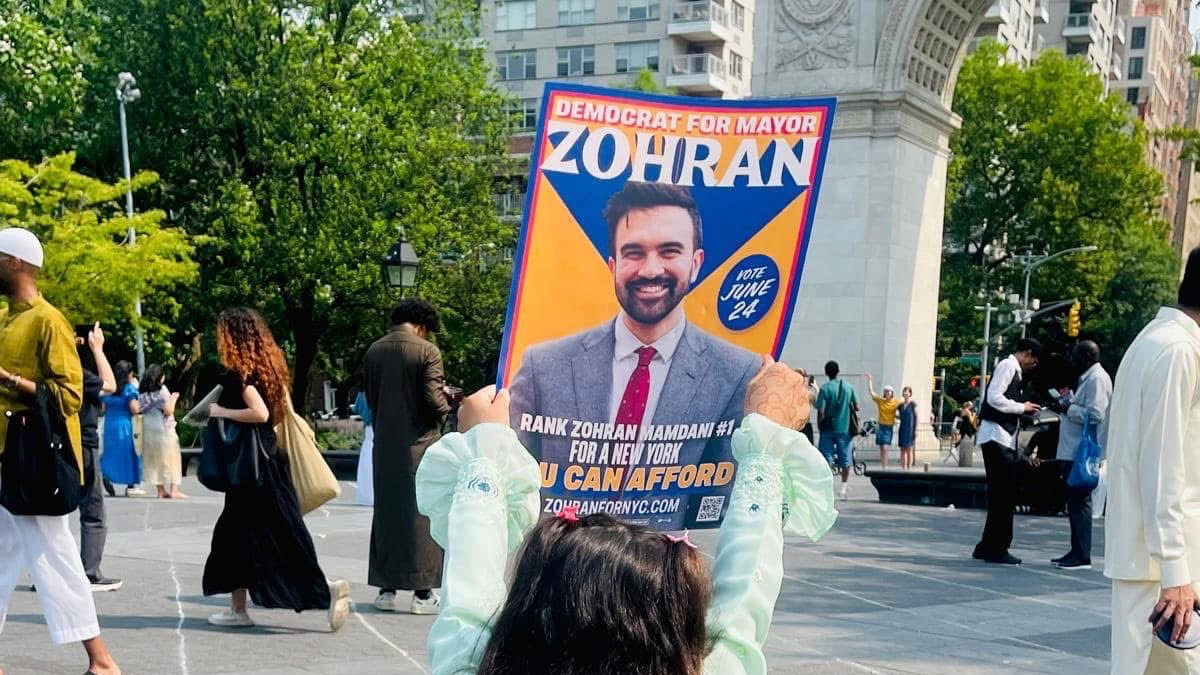Between good and bad: Zohran Mamdani and politics of Muslim legibility

In 2004, political theorist Mahmood Mamdani famously deconstructed the post-9/11 rhetoric that sorted Muslims into two categories: “Good Muslims”, the secular, obedient, and Western-aligned; and “Bad Muslims”, the devout, political, and resistant. This binary, Mamdani argued, was never about Islam itself but about maintaining imperial control by rewarding docility and punishing dissent.
Twenty years later, Mamdani’s son, Zohran Kwame Mamdani, is an elected official in New York’s State Assembly and a rising political force. Zohran’s ascent has inspired hope across immigrant, Muslim, and progressive communities, particularly due to his vocal stance on housing justice and Palestinian liberation. But it also raises a critical question: within the very frame his father condemned, how is Zohran Mamdani being read: as a Good Muslim, a Bad Muslim, or something far more unsettling for the American political establishment?
Before evaluating Zohran, it is worth revisiting what Mahmood Mamdani meant when he described the dichotomy of Good and Bad Muslims. In the aftermath of 9/11, Western powers, led by the U.S., began distinguishing between Muslims who were “moderate” and those who were “radical.” This wasn’t a religious assessment; it was a political project.
The Good Muslim was the one who renounced violence, affirmed democracy, assimilated quietly, and ideally practised a private, apolitical Islam, if at all. The Bad Muslim was the one who resisted, questioned U.S. foreign policy, expressed solidarity with Palestine, or even practised Islam with political consciousness. The consequence? Surveillance, marginalisation, drone wars, and a vast global apparatus of Islamophobia.
The framework wasn’t merely analytical; it shaped how states treated entire populations. And now, in 2025, its afterlives are visible in the backlash to Zohran Mamdani’s politics.
Zohran Mamdani was born in Kampala, Uganda, and raised in New York. His mother is the celebrated Indian filmmaker Mira Nair, and his father, Mahmood Mamdani, is among the most influential postcolonial thinkers of our time. A graduate of Bowdoin College and a member of the Democratic Socialists of America (DSA), Zohran was elected to the New York State Assembly in 2021, representing Astoria, Queens.
He is articulate, media-savvy, and relatable. He’s campaigned door-to-door, released ads in Hindi and Bangla, and often speaks of class struggle in immigrant neighbourhoods. On paper, he resembles the liberal dream: a child of immigrants, working for the people, with Ivy League polish and multicultural fluency.
But scratch beneath the surface, and his politics become more complicated and more threatening to the system.
To many progressives, Zohran is a “model minority” redefined: Muslim, but secular; brown, but charismatic and electable; concerned with the poor, but never overtly Islamic in language. He doesn’t wear overt religious garb, doesn’t foreground Islam in his campaign rhetoric, and speaks in the shared lexicon of the left: tenant protections, food justice, and union rights.
He appears at Jewish solidarity events, releases statements honouring LGBTQ+ communities, and embodies a modern, inclusive progressive platform. These attributes, despite being sincere, make him eligible to America as a “safe” Muslim.
In short, he checks many of the “Good Muslim” boxes. But that perception unravels the moment Zohran does something the establishment doesn’t expect.
Zohran has openly supported Palestinian resistance, denounced Israel’s war crimes, and refused to apologise for the chant “globalize the intifada” heard at a rally he attended. He called India’s Prime Minister Narendra Modi a war criminal, citing his role in the 2002 Gujarat pogrom, and spoke plainly about Islamophobia in both India and the United States.
In doing so, he’s invited the wrath of Zionist lobbies, Hindu nationalist organizations in the diaspora, and even centrist Democrats. In recent months, he’s been accused of “hate speech,” “radicalism,” and harbouring “extremist sympathies”, terms designed to reclassify him as a Bad Muslim in the public eye.
The punishment has been swift: political isolation, Islamophobic trolling, and targeted hit pieces in the media. He is not just being criticized, he is being re-coded.
When Zohran is feeding the hungry, he is a Good Muslim. When he speaks for Gaza, he becomes a Bad one.
Herein lies the core of the problem: Zohran Mamdani is not allowed to simply be a politician, or a Muslim, or a son. He is always being read as one or the other. The performance of Muslimness in American politics is never neutral. Either it is sterilised to be palatable, or politicised to be punishable.
This is what Mamdani Sr. warned us about: Muslims are never just Muslims. They are always cast into roles that have little to do with belief and everything to do with control. The binary is not about Islam. It’s about obedience.
And Zohran refuses to obey.
One could argue that Zohran does not fully inhabit either category. He is not the silent, cooperative Muslim who keeps religion locked behind closed doors. Nor is he the militant outsider rejecting American belonging. He is something more dangerous to power: a Muslim who speaks, who votes, who builds coalitions, who names the empire—and does so from within the belly of the beast.
This hybridity, Muslim, African, Indian, American, postcolonial, socialist, is what destabilises the binary altogether. Zohran isn’t playing the game. He’s challenging the board.
So, is Zohran Mamdani a Good Muslim or a Bad Muslim?
That’s the wrong question.
The real question is: Why are we still asking Muslims to prove their goodness in the first place? Why must the legitimacy of their politics, their grief, their solidarity, or their faith be filtered through Western anxieties?
Perhaps the most radical thing Zohran Mamdani does is not simply support Palestine or critique Modi. It is his refusal to allow his Muslimness to be managed, judged, or reduced. He lives, speaks, and acts as if he is already whole. And in a world desperate to divide Muslims into two halves, that might be the most dangerous thing of all.






